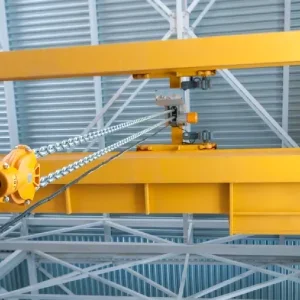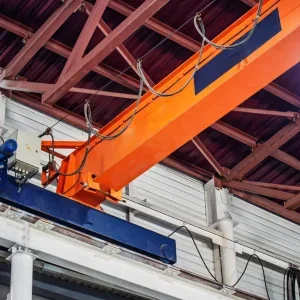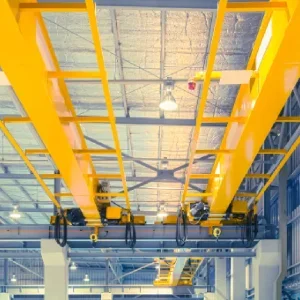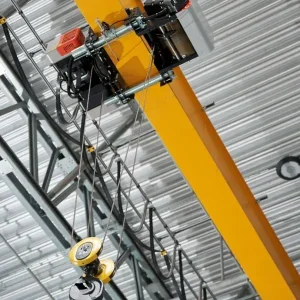The market for overhead travelling cranes in Germany is dominated by three major international players, namely Demag, Konecranes (including SWF and Stahl) and Abus. The publicly listed Demag and Konecranes appear to slug it out punch for punch across the world markets; privately-owned Abus goes about is business quietly and efficiently while maintaining a strong market position in standard cranes.
Beyond these three majors, however, are a handful of traditional crane companies that have survived the ups and downs of demand and resisted all takeover offers from larger competitors seeking to consolidate the market. They are proof that it is possible to survive happily in this business by doing things the traditional way and focusing on old-fashioned values.
One such company is Kühnezug Fördertechnik, which is celebrating its 50th anniversary this year. It has decided not to subcontract production to Poland or Asia or set up fabrication plants in a lower cost country. It has avoided large scale redundancies in the global recession of recent years. It concentrates on making cranes rather than servicing them or fixing them, and prides itself on keeping the hoists simple enough for customers to fix themselves.
With no great marketing or sales effort, the company has survived perfectly well on repeat business and word of mouth from satisfied customers.
Fördertechnik was founded in 1961 by Manfred Böttcher. Two years earlier, aged 24, he had bought a machine tool sales company called Fritz Kühne and had become the German agent of the Belgium branch of the Norwegian crane manufacturer Munck. This led him to set up his own hoist production centre in the north of Germany.
Manfred Böttcher is now 75 years old and although he long ago passed on ownership and management to the business to his son Jan, still comes into work every day, doing what interests him without having to worry about paperwork , bills or administration.
Jan Böttcher says he was never under any pressure to take over the family business but it was something he just wanted to do. As a boy he often joined his father at work. “I got used to the smell of the steel inside the building,” he says.
Jan Böttcher, who is 37, joined the company in 1998 after completing his studies. The transfer of ownership began more or less straightaway. He has no problem having the old man hanging around. “It’s good to have someone to discuss things with,” he says. “My father and I have quite different personalities but we work well together.”
The company operates from a sales office in Hamburg and a production site some 60km to the north in Schleswig, towards the Danish border.
Kühnezug’s core business is larger cranes over 80t SWL “or less tonnage but higher FEM groups”, Jan Böttcher says. “Usually we have customers with special requirements; certain problems that they need us to solve.”
However, it is not into the really big cranes of 300t or more, such as used in steel processing. “That is a different world,” he says.
Kühnezug has an international network of agents in approximately 25 countries to which it supplies hoists and crane kits.
In Germany it operates as a crane builder, making many components, such as hoists, in house. When subcontractors are used, they tend to be locally based.
“We looked at subcontracting or moving production to Poland or further east,” says Böttcher, “but we didn’t want to lose any jobs from our area. We are a family company. My father founded it, I took it over, and I hope one day my children will take it over. We are not doing this for any shareholders so we are not always looking for the biggest mega results.”
All he needs, he says, is food on the table each day, a car to drive and a roof over his head.
“We resolved to be competitive and stay in Germany. All our suppliers are from Germany, or if we can’t get it from Germany then a neighbouring country. Of course, some parts, like frequency inverters are only made in Asia.
“Every day is a challenge for us to be better. We need the dedication of our employees to do this. So my dedication for them is to run the business as best I can and keep it here.”
After the global economy took a nosedive in 2008-09, many manufacturing companies in Germany – and indeed across the world – laid off staff, introduce reduced shifts and had extended summer closures. Not Kühnezug, says Böttcher. The German government introduced a scheme to support workers facing reduced hours, which many companies were happy to benefit from. “We never had a single day where we thought of doing it,” he says. “Of course, projects were dumped or delayed but we always had enough work. We did not have to let any employees go.”
Today business appears to be picking up, he says. The level of work from German customers is good. Internationally, enquiry levels have definitely returned but there is still some uncertainty about projects actually starting. “People are no longer saying no but decisions are still slow,” he says.
A revenue stream that Kühnezug does not chase is crane servicing and maintenance contracts. It does offer servicing for its own cranes but has only taken on the maintenance of other makes when it has installed a new crane for a customer and been asked to look after all cranes in the factory. ”We don’t go looking to maintain other makes,” Böttcher says. “Our philosophy is that the customer should be able to help himself” – which seems like heresy in the modern crane industry. He explains that Kühnezug’s cranes are designed to be as simple as possible to be repaired without needing any proprietary software and laptop. “We have a closed winch system with the drum, motor and gearbox all in a line. There is no coupling or steel construction that can move. Our drive unit can be unbolted and easily replaced, if required,” Böttcher says.
Kühnezug has been using polyamide running wheels for the past 40 years, which are not only quieter than steel wheels but allow direct running on the upper flange of the crane girder, removing the cost of a crane rail.
Kühnezug also pioneered the use of oval profile girders, which it calls OVALplus. This profile is inherently strong and so reduces the amount – and weight – of steel material required, saving further costs. They are made simply by pressing steel tubes into an oval shape, eliminating welds.
All along the way the Böttchers have sought to keep Kühnezug below the radar of its major competitors and not draw attention to themselves. “Our competition is many times bigger than us so we are not really interested in talking too much.” This also explains their reluctance to answer questions relating to the size of the company, employee numbers, sales turnover or profitability. There has not even been any great rush to get the company’s website up and running, it seems. Instead the focus is simply on building cranes and keeping customers happy enough to keep coming back and to tell their friends.
But of course this is a small industry. The big competitors certainly know about Kühnezug. Jan Böttcher says he receives by mail several approaches every year asking if he wants to sell the business or get into some sort of discussion. Usually there is no way of knowing who is behind these approaches, he says. Some are probably from business brokers looking to make a deal or from venture capitalists wanting something to buy, strip and sell. And it is very likely that some are from competitors, or at least from someone acting on their behalf.
“But we never reply. We are not interested,” Böttcher says.






